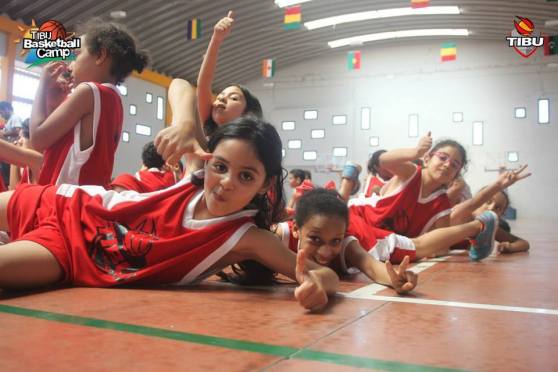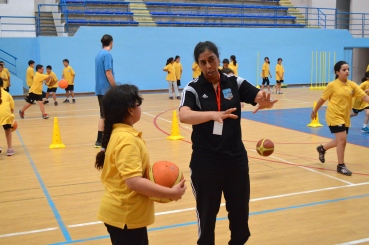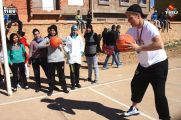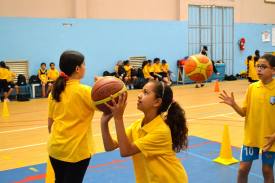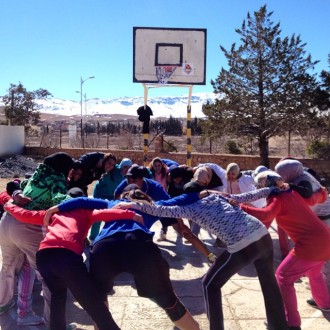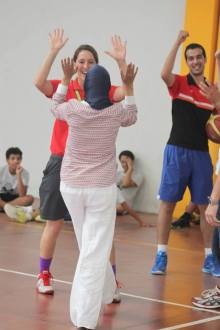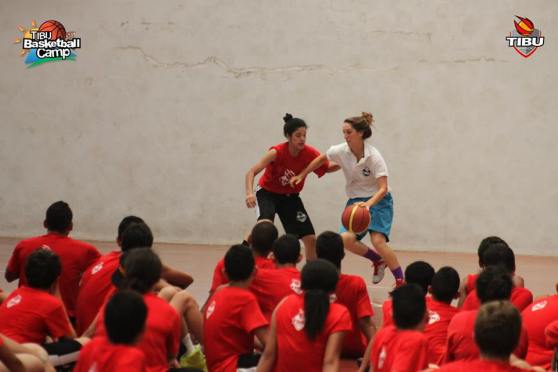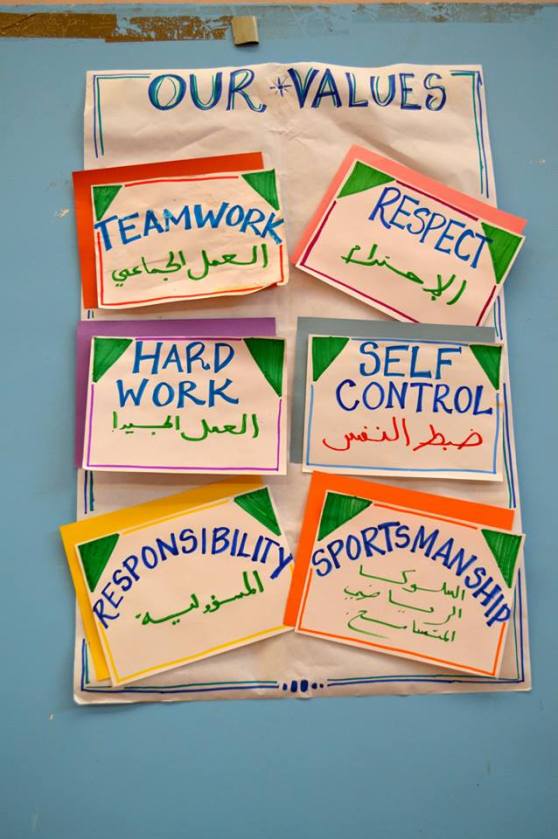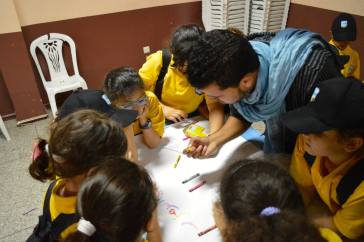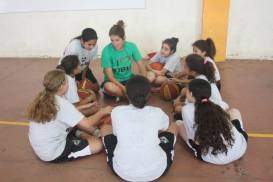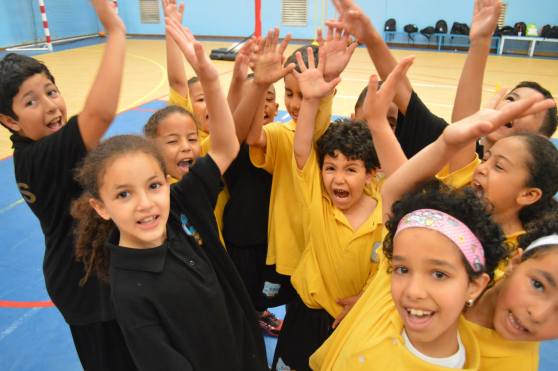Peace Corps Volunteer Olivia DiNucci shares her thoughts on girls basketball in Morocco. More information about Olivia's service is available on her blog.
“Ntia s7i7a ”-You girl, are strong.
I say this to the under 13 girls I coach during our bi-weekly practices. I usually find myself saying it as soon as one is about to cry because the ball hit her somewhere other than in her hands. Before the tears fall, I say it again but this time I bend down looking directly into her eyes. “Ntia S7ahia,” indirect translation: you girl, are strong and really the ball didn’t hurt when it hit your elbow so, don’t even think about crying.
When girls are out on the basketball court (and I can only assume the soccer field, track, etc), sometimes we treat them daintily, as though they are weak, much more likely to overly comfort them if they get hurt or give them a break before we would give one to the boys. We think we are helping them, but most of the time we’re doing the opposite. Instead, we should be treating them as athletes—not constantly viewing them as girls and boys. Setting higher expectations for girls is not just important, it is imperative in order to increase their confidence and sense of value on, and more importantly, off the court. This isn’t to say that all players will commit to the sport, but like anything else, introducing things young gives individuals a better opportunity to develop and excel at something.
Discrimination towards girls and women, specific to the sports world and beyond, can be drastically decreased if we combine equal opportunity with setting higher expectations for girls. Since the first week of our Peace Corps service in Essaouira, Morocco, Kabir and I coached basketball in site and since then, around the country with the national basketball organization TIBU Maroc. In some situations and contexts, getting girls out on the court is a success in itself. But, in some cases it is not enough.
Sure, biologically, our bodies and how they develop are different. As a collective, most male athletes have certain physical abilities that can outperform the opposite sex. Jumping higher, running faster, dunking more impressively. Many women and girls jump high, run fast, and even dunk, but it’s not the norm and it’s certainly not expected. The insult still remains, like a girl.
The media bombards us with negative connotations and slighted comments when it comes to women in sports. Even World Champions and Olympic Gold Medalists face severe discrimination. The struggle is constant and although it should not and cannot be compared, it exists everywhere in the sports world—developed countries and developing.
Inequality is not confined to sports, but if there is an opportunity for boys to play and compete, that same opportunity should be offered for girls. Boys 3×3 tournament? Girls 3×3 tournament. Boys get new uniforms? Girls get new uniforms. The capital city holds a tournament for teams from 10 cities throughout Morocco? Both boys and girls teams come to play. Will there be more boys teams that show up? Maybe, but that should not limit the number of girls teams that get their fair share of court time.
Girls love basketball in Morocco. This is sweeping generalization that I know we should avoid, but through observations, I can substantiate the claim. Time after time, from my experience as well as from other Moroccan coaches and Peace Corps Volunteers around the country, the interest of basketball among girls is palpable. During the TIBU National School Tour (NTST), girls from large cities to small towns were eager to get a ball in their hands and in Essaouira, females young and old are constantly ready to do what they love—play basketball.
Since the national popularity isn’t going away, coaches, clubs and programs need to continue (or in some cases, start) supporting more opportunities for girls to participate and excel in basketball and the positive values along with it. Equal opportunity doesn’t mean that every school, every club and every town will have the same amount of interest from girls and boys but it does mean that the girls will have the chance to play and be coached to improve and compete.
Nothing is more exciting than stepping onto the court and realizing that there are 30 boys and 30 girls looking up at you ready to play (this happened at our Essaouira basketball camp this summer). Although sports are generally gender separated (and usually for good reason) I love seeing co-ed play. Some of the 13 year old girls that we coach weekly improved significantly over the last year and now practice with the more skilled boy players.
They are proud and eager to be more competitive and prove themselves on the court. These girls are respected by the boy players and consider each other teammates. Similarly, in the TIBU camp I worked four female players practiced and competed on male teams. In both instances, the girls who worked their way up to playing in more competitive divisions present higher levels of confidence and leadership on and off the court (they’re not the only ones).
Basketball is a medium in which positive life values are transferred. More girls are attending university and in the work force more than ever in Morocco, values learned through basketball transfer to other areas of their life.Teamwork, discipline, self control, responsibility and respect are ones we have focused on at both the local and national level when promoting basketball. As for girls, especially going through puberty, self esteem and self worth are crucial to maintain and build upon for their personal and professional lives.
In more competitive contexts, when girls are out on the court, given the opportunity to play and compete, the same rules should apply. If they aren’t performing to the best of their ability, they get taken out. Setting high expectations for female athletes means they too, have to work hard to achieve a goal and develop better leadership and communication skills to get their teammates on board. Letting things slide, letting them be soft, is enabling, not empowering.
Expectations for girls in sports is important, and is my driving point here, because for so many it is so easily lost. Why are you complaining, girls are playing? Playing yes, but improving, working, striving for results, often times, no. This is the next stage of basketball in Morocco. It is no longer enough to just give them the court time, they must be expected to perform, not for the pride of the city, or club, but for the pride from within themselves.
As girls get older, expectations start weighing heavily in many areas of life, generally not regarding athletics. Sometimes that means picking school and studies over sports. Usually it means helping out at home and taking care of younger siblings. Sometimes it means marriage. This is where the translation and applicability of basketball doesn’t follow through. Parents need help imagining how much stronger their girl will be in all aspects of life when equipped with the tools gained through basketball.
This month I worked both of TIBU’s summer basketball camps, under 13 and under 18. At the U18 camp I led girls empowerment workshops each morning. I was “teaching” them, but instead the problems and challenges we as women face. Not me as the westernized woman and them as Moroccan women. It was the highlight of my week as we dug deeper into the limitations, roles and stereotypes women and girls face by the media, education systems, families and culture and together came up with personal solutions to these challenges. I used resources from the Peace Corps Morocco Gender and Development Committee. We watched video clips on inspirational women and success stories in Morocco and in the US, we analyzed advertisements and campaigns such as “Girls Can” (Covergirl featuring famous spokeswomen) and “This Girl Can” (featuring women of all shapes and sizes getting up and working out no matter how much they may jiggle). We shared personal stories, wrote about important female role models in our lives and participated in other self esteem activities. We had discussions and debates on how it takes an entire society to help raise girls up. Throughout the classes two male coaches sat in and participated in the classes and were supportive and intrigued by what the girls had to say (both verbalized wanting to help implement more workshops like this in the future). Here are some photos of the classes and the video the girls made for the Always #LikeAGirl #UNSTOPPABLE campaign.
Kabir and I will continue with coaching the under 13 basketball teams and I will help with one of Essaouira’s older women’s teams this year as well. But what I am most happy and proud of is that after working with TIBU for the past year and a half, myself and TIBU’s president are planning for a girls basketball and empowerment camp for 40-50 of Morocco’s best players under 18. While the main focus will be basketball training and competition, workshops on gender related issues and special guests will combine the elements important to the girls as they continue as basketball players but also as individuals in society. In the next year we will be recruiting the girls from across Morocco as well as coaches and partners. It may be a year away, but my excitement can’t hold me back from already starting to prepare for it.
Girls basketball has positive potential in Morocco, and in my opinion, equal opportunity and heightened expectations have a lot to do with making not only stronger basketball players but stronger women.
**All photos from TIBU were taken by photographer Walid Broud

